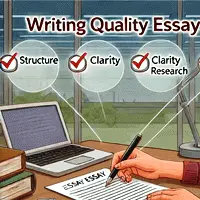 Completing your research paper and you feel overwhelmed by the hectic task of editing and proofreading? Many researchers and students encounter this challenge as they strive for academic excellence. Editing a paper is a crucial step in the research process, as it ensures the clarity, coherence, and quality of your work. It's the fine-tuning that can transform a good paper into an exceptional one hence our guidance and support in paper editing. Editing is more than just correcting grammar and typos; it involves a comprehensive review of your paper's structure, content, and argumentation. It requires a keen eye for detail and an understanding of the conventions of academic writing. Our team of experienced editors and proofreaders is well-equipped to assist you in this process as they can meticulously examine every aspect of your paper to ensure it meets the highest academic standards. One of the most crucial aspects of editing is maintaining a consistent and coherent flow of ideas. Our experts will work on enhancing the logical progression of your arguments, making sure that your paper presents a unified and well-structured narrative which not only improves the overall readability but also strengthens the persuasiveness of your research. Our editing services extend beyond mere language correction. Pay close attention to the accuracy of your citations and references, ensuring that your paper adheres to the appropriate citation style, be it APA, MLA, Chicago, or any other. Proper citation is essential to avoid plagiarism and to give credit to the original authors whose work you've referenced in your research. You should focus on the clarity and conciseness of your writing to help you eliminate redundant phrases, jargon, and unnecessary repetition, making your paper more accessible to your target audience. When you choose our editing services, you're not just receiving assistance; you're investing in the success of your research paper since we are committed to helping you achieve your academic goals by providing you with the best guidance and support. With our expertise and attention to detail, your paper will shine, leaving a lasting impression on your readers and reviewers so let us help elevate your research paper to its full potential.
Completing your research paper and you feel overwhelmed by the hectic task of editing and proofreading? Many researchers and students encounter this challenge as they strive for academic excellence. Editing a paper is a crucial step in the research process, as it ensures the clarity, coherence, and quality of your work. It's the fine-tuning that can transform a good paper into an exceptional one hence our guidance and support in paper editing. Editing is more than just correcting grammar and typos; it involves a comprehensive review of your paper's structure, content, and argumentation. It requires a keen eye for detail and an understanding of the conventions of academic writing. Our team of experienced editors and proofreaders is well-equipped to assist you in this process as they can meticulously examine every aspect of your paper to ensure it meets the highest academic standards. One of the most crucial aspects of editing is maintaining a consistent and coherent flow of ideas. Our experts will work on enhancing the logical progression of your arguments, making sure that your paper presents a unified and well-structured narrative which not only improves the overall readability but also strengthens the persuasiveness of your research. Our editing services extend beyond mere language correction. Pay close attention to the accuracy of your citations and references, ensuring that your paper adheres to the appropriate citation style, be it APA, MLA, Chicago, or any other. Proper citation is essential to avoid plagiarism and to give credit to the original authors whose work you've referenced in your research. You should focus on the clarity and conciseness of your writing to help you eliminate redundant phrases, jargon, and unnecessary repetition, making your paper more accessible to your target audience. When you choose our editing services, you're not just receiving assistance; you're investing in the success of your research paper since we are committed to helping you achieve your academic goals by providing you with the best guidance and support. With our expertise and attention to detail, your paper will shine, leaving a lasting impression on your readers and reviewers so let us help elevate your research paper to its full potential.
The most ideal techniques for editing a research paper;
- Read the Paper with a Fresh Perspective: Begin by reading the paper aloud or silently, paying attention to the flow of ideas, coherence, and overall structure, and look for areas where your writing may lack clarity or logical progression. We advise taking note of any sentences or paragraphs that seem convoluted or difficult to understand which will help you identify the primary areas that require improvement.
- Refine Your Thesis Statement: Ensure that your thesis statement is concise, clear, and reflects the central argument of your paper. During the editing process, reassess your thesis statement and evaluate if it aligns with the evidence presented in your paper. By seeking help to edit a research paper, our experts make any necessary adjustments to ensure that your thesis is well-supported by your research.
- Streamline Your Arguments: Ensure that your arguments are presented logically and coherently since each paragraph should contain a clear topic sentence that supports your thesis statement, examine the transitions between paragraphs, and ensure that they are smooth and seamless. Eliminate any redundant or irrelevant information that distracts from your main points as conciseness is key when it comes to presenting your research findings.
- Strengthen Your Language: Aim for clarity and precision in your writing by replacing vague or ambiguous words with specific terms that accurately convey your intended meaning and avoid excessive jargon that may confuse or alienate your readers. Eradicate unnecessary wordiness by removing filler phrases and tightening your sentences.
- Correct Grammar and Punctuation: Proofread your work carefully, checking for common errors such as subject-verb agreement, verb tense consistency, and proper comma usage. Pay attention to sentence structure and ensure that your sentences are varied in length and style and consider utilizing grammar-checking tools to assist you in catching any overlooked mistakes.
- Check Formatting and Citations: Verify that your in-text citations and reference list conform to the appropriate citation style (e.g., APA, MLA) by ensuring that all sources are accurately cited and properly credited. Double-check the accuracy of your references, including page numbers, titles, and authors' names.
- Seek Feedback: Editing your research paper can be a solitary effort, but seeking feedback from others, like our experts, can greatly enhance its quality. Share your paper with a trusted colleague, mentor, or professor and ask for their input. Welcoming different perspectives will help you identify areas of improvement that you may have overlooked.
Seeking assistance for editing papers can be a critical step towards ensuring its quality and academic rigor. The process of editing is a critical component of scholarly writing, as it refines the paper's clarity, coherence, and overall presentation. It is essential to recognize that even the most well-researched and meticulously written papers can benefit from a fresh set of eyes to identify errors, inconsistencies, or areas for improvement. Our commitment to providing the best guidance in research editing stems from a profound understanding of the challenges faced by researchers and academics. Our experienced team of research editors possesses the expertise to meticulously review your paper, addressing issues related to grammar, syntax, punctuation, and formatting. We pay meticulous attention to the paper's structure, flow of ideas, and logical coherence to enhance its overall impact as well as recognize the significance of your research and the effort invested in it. Our editing services are tailored to preserve the integrity of your work while elevating it to the highest standards of academic excellence. We are dedicated to assisting you in achieving the best possible outcomes for your research paper, ensuring that your ideas are communicated effectively and professionally; let us help you shine in the academic field.
“Someone Edit my Paper for Me” Consult a Proficient Expert
 The research paper stands as a culmination of years of learning, a testament to one's expertise, and a tangible reflection of intellectual growth. It is a task that demands not just diligence but a keen understanding of the subject matter, originality, and, above all, the assurance of being entirely free from the shadows of plagiarism. Editing a paper that meets these exacting standards is a formidable challenge, one that often necessitates the guidance of well-trained experts. At Research Writing Help, we recognize the profound significance of this academic task and the value of ensuring it is uniquely tailored to each student's individual needs. Where information is readily accessible and the temptation to cut corners may arise, the need for an authentic, custom-crafted research paper is more pressing than ever. The process of editing any paper extends beyond mere research and writing; it involves a symphony of knowledge, creativity, and meticulous attention to detail. This is where the expertise of our dedicated professionals comes into play. They are not just editors; they are scholars, researchers, and experts in their respective fields, well-versed in the art of transforming ideas into eloquent prose. What sets our experts apart is their deep-seated commitment to understanding the details of your subject matter. They embark on an expedition through the vast field of literature, exploring the facts of your chosen topic, and drawing upon a wealth of knowledge to shape a paper that not only satisfies academic requirements but also adds value to the existing body of knowledge. Each paper is treated as a unique voyage, with its own challenges and discoveries. We are well-versed in the diverse tapestry of writing styles that different academic disciplines demand. Whether it's the precision of APA, the clarity of MLA, or the formality of Chicago, our experts adapt seamlessly to these conventions, ensuring that your paper mirrors the language and style of your chosen field. The quest for originality is a cornerstone of academic papers, and our experts are resolute in their commitment to this principle. They inject creativity into your work, ensuring that your ideas shine brightly amidst a sea of academic papers. Their dedication to producing work that is distinct, innovative, and reflective of your personal insights is unwavering. We will look deeper into the multifaceted role of our well-trained experts, exploring how they customize your research paper to your unique needs, the meticulous editing process they employ, and the primary objectives they seek to accomplish through their editorial efforts. Through a blend of structured points and unstructured prose, solve the complex tapestry of research writing, shedding light on the artistry and craftsmanship that goes into creating a plagiarism-free research masterpiece that stands as a testament to your academic study.
The research paper stands as a culmination of years of learning, a testament to one's expertise, and a tangible reflection of intellectual growth. It is a task that demands not just diligence but a keen understanding of the subject matter, originality, and, above all, the assurance of being entirely free from the shadows of plagiarism. Editing a paper that meets these exacting standards is a formidable challenge, one that often necessitates the guidance of well-trained experts. At Research Writing Help, we recognize the profound significance of this academic task and the value of ensuring it is uniquely tailored to each student's individual needs. Where information is readily accessible and the temptation to cut corners may arise, the need for an authentic, custom-crafted research paper is more pressing than ever. The process of editing any paper extends beyond mere research and writing; it involves a symphony of knowledge, creativity, and meticulous attention to detail. This is where the expertise of our dedicated professionals comes into play. They are not just editors; they are scholars, researchers, and experts in their respective fields, well-versed in the art of transforming ideas into eloquent prose. What sets our experts apart is their deep-seated commitment to understanding the details of your subject matter. They embark on an expedition through the vast field of literature, exploring the facts of your chosen topic, and drawing upon a wealth of knowledge to shape a paper that not only satisfies academic requirements but also adds value to the existing body of knowledge. Each paper is treated as a unique voyage, with its own challenges and discoveries. We are well-versed in the diverse tapestry of writing styles that different academic disciplines demand. Whether it's the precision of APA, the clarity of MLA, or the formality of Chicago, our experts adapt seamlessly to these conventions, ensuring that your paper mirrors the language and style of your chosen field. The quest for originality is a cornerstone of academic papers, and our experts are resolute in their commitment to this principle. They inject creativity into your work, ensuring that your ideas shine brightly amidst a sea of academic papers. Their dedication to producing work that is distinct, innovative, and reflective of your personal insights is unwavering. We will look deeper into the multifaceted role of our well-trained experts, exploring how they customize your research paper to your unique needs, the meticulous editing process they employ, and the primary objectives they seek to accomplish through their editorial efforts. Through a blend of structured points and unstructured prose, solve the complex tapestry of research writing, shedding light on the artistry and craftsmanship that goes into creating a plagiarism-free research masterpiece that stands as a testament to your academic study.
How does hiring a well-trained expert help customize your paper?
- In-depth Subject Knowledge: Our experts boast a wealth of knowledge in various fields thus when you hire them, you tap into their expertise, ensuring your paper aligns perfectly with your subject matter as they understand the details and hardships of your topic, ensuring a custom-tailored approach.
- Personalized Research: We conduct thorough research, delving deep into the literature relevant to your paper to ensure it is not only plagiarism-free but also showcases an understanding of the subject that goes beyond surface-level content.
- Customized Writing Style: Each academic discipline has its own preferred style and our experts are well-versed in these styles, whether it's APA, MLA, Chicago, or any other hence they adapt the writing to meet the specific requirements of your field, ensuring seamless integration with your project.
- Unique Ideas and Perspectives: Originality is key in academic writing thus our skilled experts bring fresh ideas and perspectives to the table as they infuse creativity into your paper, making it stand out among the collection of similar papers; your work will be truly one-of-a-kind.
- Adherence to Guidelines: Your institution likely has specific guidelines for papers thus our experts meticulously follow these guidelines, ensuring every aspect of your paper is in compliance; from formatting to citation style, they leave no stone unturned.
- Plagiarism-Free Guarantee: Plagiarism is a cardinal sin in academia thus when you request "someone edit my paper for me", our experts take this seriously and use advanced plagiarism detection tools to ensure your paper is 100% original; you can rest easy knowing your work is free from any form of plagiarism.
Why do experts double-check your paper during the editing process?
Our experts understand that editing is a crucial step in the writing process. It's not just about fixing grammatical errors or typos; it's about ensuring that your paper is a polished, refined, and coherent piece of academic work. That's why they go the extra mile to double-check your paper during the editing process. Even the best writers can overlook small mistakes, and these errors can detract from the overall quality of your paper. Our experts comb through every word, sentence, and paragraph to catch and rectify any grammatical, punctuation, or spelling errors which ensures that your paper reads smoothly and professionally. Our experts focus on clarity and coherence as they scrutinize the flow of your paper, ensuring that your ideas are presented logically and coherently. They work to eliminate any ambiguities or awkward phrasings that might hinder the reader's understanding. A well-organized and coherent paper enhances readability and comprehension. Consistency is another key aspect of the editing process which is why our experts pay close attention to formatting, citation style, and the use of terminology. They ensure that your paper maintains uniformity throughout, giving it a polished and professional appearance. We cross-reference all facts and data to ensure their accuracy and currency which adds credibility to your research, making it more reliable and trustworthy. The double-checking process includes a second round of plagiarism detection. While we pride ourselves on delivering plagiarism-free work from the start, our experts conduct an additional check to guarantee the absence of any unintentional instances which is essential to maintain academic integrity and ensure that your paper is entirely original. Our experts double-check your paper during the editing process to ensure that it meets the highest standards of quality, clarity, accuracy, and professionalism. Their dedication to excellence is a testament to our commitment to delivering outstanding research papers tailored to your unique needs.
What are the main objectives of editing a research paper?
- Enhancing clarity and coherence: Editing aims to improve the overall clarity and coherence of the research paper which includes refining the language, eliminating jargon, and ensuring that the content flows smoothly.
- Correcting grammar and language errors: Editing involves identifying and rectifying grammatical mistakes, awkward sentence structures, and inappropriate word choices to help produce a polished and professional manuscript.
- Improving organization and structure: We focus on improving the organization and structure of the research paper which is why we ensure that the paper follows a logical flow, with clear headings, subheadings, and paragraphs.
- Ensuring adherence to guidelines: Our editors ensure that the research paper adheres to the guidelines provided by the target journal or conference as they check for proper formatting, citation style, and referencing.
- Checking for factual accuracy: We verify the accuracy of the data, facts, and references cited in the research paper which helps to maintain the integrity of the research and ensure that the findings are valid and reliable.
The process of crafting research papers, the pinnacle of your academic work, is not one to be taken lightly. It demands meticulous attention, expertise, and a commitment to excellence. Hiring our well-trained editors can be the key to unlocking your full potential in this study. These professionals bring a wealth of subject knowledge, ensuring that your project is finely tailored to your specific field of study. Our dedication to thorough research, personalized writing styles, and dedication to adhering to institutional guidelines guarantee a customized, original paper. The editing process, overseen by our experts, serves as a crucial checkpoint for enhancing the overall quality, clarity, and coherence of your work. Through proofreading, fact-checking, and maintaining consistency, our experts ensure that your research not only meets academic standards but also stands out as a polished, well-crafted masterpiece. The objectives of editing are achieved with precision, contributing to the success of your academic studies. Investing in expert assistance with research editing is a decision that can redefine your educational path, setting you on a course toward excellence.










